汉语歇后语英语翻译方法
歇后语的分类与英译
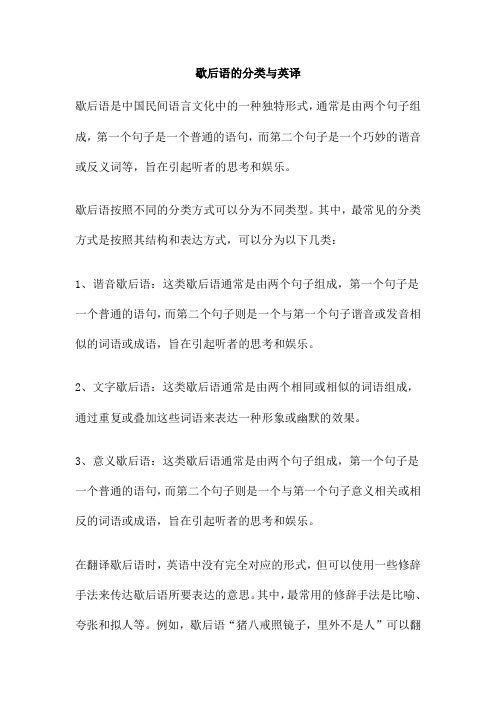
歇后语的分类与英译歇后语是中国民间语言文化中的一种独特形式,通常是由两个句子组成,第一个句子是一个普通的语句,而第二个句子是一个巧妙的谐音或反义词等,旨在引起听者的思考和娱乐。
歇后语按照不同的分类方式可以分为不同类型。
其中,最常见的分类方式是按照其结构和表达方式,可以分为以下几类:1、谐音歇后语:这类歇后语通常是由两个句子组成,第一个句子是一个普通的语句,而第二个句子则是一个与第一个句子谐音或发音相似的词语或成语,旨在引起听者的思考和娱乐。
2、文字歇后语:这类歇后语通常是由两个相同或相似的词语组成,通过重复或叠加这些词语来表达一种形象或幽默的效果。
3、意义歇后语:这类歇后语通常是由两个句子组成,第一个句子是一个普通的语句,而第二个句子则是一个与第一个句子意义相关或相反的词语或成语,旨在引起听者的思考和娱乐。
在翻译歇后语时,英语中没有完全对应的形式,但可以使用一些修辞手法来传达歇后语所要表达的意思。
其中,最常用的修辞手法是比喻、夸张和拟人等。
例如,歇后语“猪八戒照镜子,里外不是人”可以翻译成“Like a pig pretending to be human -- a disgrace to yourself and others”,其中使用了比喻和夸张的手法来表达这个歇后语的意思。
总之,歇后语是中国民间语言文化中的一种独特形式,通过不同的分类方式和翻译方法,可以让更多的人了解和认识歇后语。
歇后语是中国民间语言文化的一种独特形式,它通常是由两个或多个简洁而生动的词语或句子组成,具有浓厚的地域性和民族特色。
歇后语的特点是幽默、风趣、形象生动,常常带有浓厚的地域文化和时代印记,是中国民间智慧的结晶。
然而,歇后语的英译并不容易,因为它们往往涉及到中国的历史、文化、社会和风俗习惯,以及中国人民的生活经验和价值观念。
从文化视角看歇后语的英译,我们需要考虑到歇后语的文化内涵和语言特点。
歇后语往往使用形象生动的比喻和富有趣味的表达方式,这些都需要在英译中得到充分的体现。
传统歇后语现代新编中英对照版
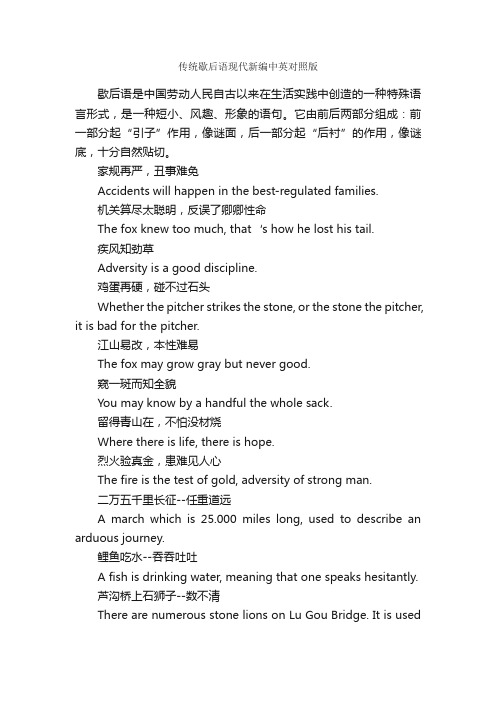
传统歇后语现代新编中英对照版歇后语是中国劳动人民自古以来在生活实践中创造的一种特殊语言形式,是一种短小、风趣、形象的语句。
它由前后两部分组成:前一部分起“引子”作用,像谜面,后一部分起“后衬”的作用,像谜底,十分自然贴切。
家规再严,丑事难免Accidents will happen in the best-regulated families.机关算尽太聪明,反误了卿卿性命The fox knew too much, that‘s how he lost his tail.疾风知劲草Adversity is a good discipline.鸡蛋再硬,碰不过石头Whether the pitcher strikes the stone, or the stone the pitcher, it is bad for the pitcher.江山易改,本性难易The fox may grow gray but never good.窥一斑而知全貌You may know by a handful the whole sack.留得青山在,不怕没材烧Where there is life, there is hope.烈火验真金,患难见人心The fire is the test of gold, adversity of strong man.二万五千里长征--任重道远A march which is 25.000 miles long, used to describe an arduous journey.鲤鱼吃水--吞吞吐吐A fish is drinking water, meaning that one speaks hesitantly.芦沟桥上石狮子--数不清There are numerous stone lions on Lu Gou Bridge. It is usedto describe a large amount.雷声大,雨点小Actions speak louder than words.烈火炼真金,患难见真情Liquor brings out a person‘s true color。
歇后语的翻译

1、一词两义的双关 2、谐音的双关
一词两译的双关
Examples:
1、咱们骑着毛驴看唱本----走着瞧吧! 译:We‘ll see who’s right. 2、等他们赶来增援时,已是“正月十五贴门 神--------晚了半月啦”。 译:But they were too late for a rescue.
0
根据本地风俗和中国文化相结合
1.one finger cannot lift a small stone 爱尔兰谚语:独木难支。或:团结就是力量 2.when an ant says"ocean",he is talking about a small pool. 坐井观天.
3.he who would do great things should not attempt them all alone. 一个好汉三个帮。
谐音双关
Examples:
1,......再过几天,还不是外甥打灯笼---------照舅(旧) 译:Even in a few days things will be back to what they were before...
2,他的腿跑肿了,心费烂了,还是闹个瞎子点灯-------白费蜡 译:Many days of running and boasting not only availed him nothing but failed even to give him one shred of hope .He was ,as the saying goes,like a blind man using a candle -----------only wastering wax.
歇后语英译-模板
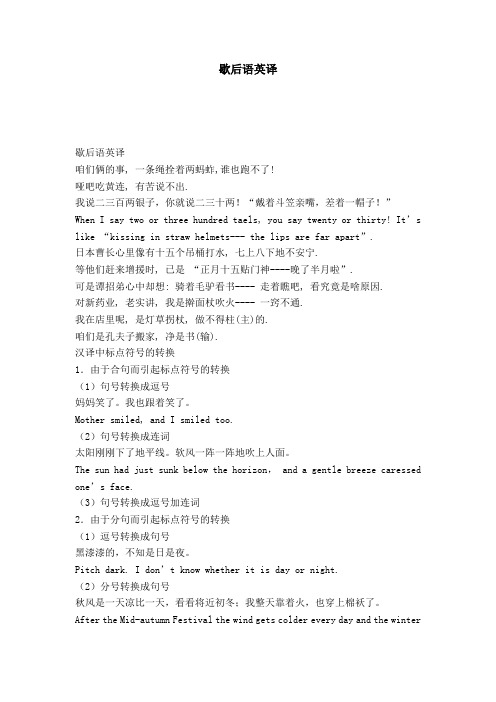
歇后语英译歇后语英译咱们俩的事, 一条绳拴着两蚂蚱,谁也跑不了!哑吧吃黄连, 有苦说不出.我说二三百两银子,你就说二三十两!“戴着斗笠亲嘴,差着一帽子!”When I say two or three hundred taels, you say twenty or thirty! It’s like “kissing in straw helmets--- the lips are far apart”.日本曹长心里像有十五个吊桶打水, 七上八下地不安宁.等他们赶来增援时, 已是“正月十五贴门神----晚了半月啦”.可是谭招弟心中却想: 骑着毛驴看书---- 走着瞧吧, 看究竟是啥原因.对新药业, 老实讲, 我是擀面杖吹火---- 一窍不通.我在店里呢, 是灯草拐杖, 做不得柱(主)的.咱们是孔夫子搬家, 净是书(输).汉译中标点符号的转换1.由于合句而引起标点符号的转换(1)句号转换成逗号妈妈笑了。
我也跟着笑了。
Mother smiled, and I smiled too.(2)句号转换成连词太阳刚刚下了地平线。
软风一阵一阵地吹上人面。
The sun had just sunk below the horizon, and a gentle breeze caressed one’s face.(3)句号转换成逗号加连词2.由于分句而引起标点符号的转换(1)逗号转换成句号黑漆漆的,不知是日是夜。
Pitch dark. I don’t know whether it is day or night.(2)分号转换成句号秋风是一天凉比一天,看看将近初冬;我整天靠着火,也穿上棉袄了。
After the Mid-autumn Festival the wind gets colder every day and the winteris ing/approaching. Even though I sat by the fire all day, I had to wear my padded jacket.(3)破折号转换成句号(4)冒号转换成句号但是我们有一点儿不明白:我常常省下自己的零用,给乞丐,我喜欢帮助穷人。
歇后语的构成
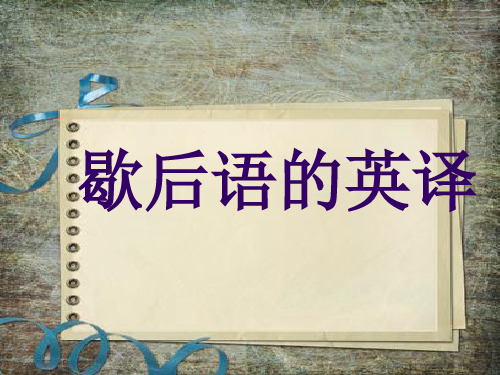
“他们没有十万八万,还敢进威虎山, 哼!那叫猫舔虎鼻梁,找死!” 曲波《林海雪原》 ’If they dared to come near us with anything less than a hundred thousand men,it would be like a kitten clawing a tiger’s nose一sure death.”
这个地区的空气污染仍然是“外甥打灯 笼——照旧(舅)” The air pollution in this region is still unchanged. 懒婆娘的裹脚又长又臭 the foot-band-ages of a slut, long and smelly. In ancient China, the cloth used for women's foot implies the articles are long and dull. Nhomakorabea
这件事,除了他三个儿子和几个经手 人外,谁也不知道,他也不对任何人 提起。哑巴吃黄连,有苦说不出。 周而复《上海的早晨》 No one … nor was he going to mention the matter to anyone else. He was like the dumb man eating the bitter herb: he had to suffer the bitterness of it in silence.
直译加注法
咸菜烧豆腐———有盐在先(有 言在先) Salted vegetables with bean curd—there is salt at the beginning, (pun) there are words beforehand. In this expression“言”(words) and“盐”(salt) are homophones.
500个中文成语、歇后语的纯正英译版

500个中文成语、歇后语的纯正英译版A bad beginning makes a bad ending.不善始者不善终。
A bad thing never dies.遗臭万年。
A bad workman always blames his tools.不会撑船怪河弯。
A bird in the hand is worth than two in the bush. 一鸟在手胜过双鸟在林。
A boaster and a liar are cousins-german.吹牛与说谎本是同宗。
A bully is always a coward.色厉内荏。
A burden of one's choice is not felt.爱挑的担子不嫌重。
A candle lights others and consumes itself.蜡烛照亮别人,却毁灭了自己。
A cat has 9 lives.猫有九条命。
A cat may look at a king.猫也可以打量国王,意为人人平等。
A close mouth catches no flies.病从口入。
A constant guest is never welcome.常客令人厌。
Actions speak louder than words.事实胜于雄辩。
Adversity leads to prosperity.穷则思变。
Adversity makes a man wise, not rich.逆境出人才。
A fair death honors the whole life.死得其所,流芳百世。
A faithful friend is hard to find.知音难觅。
A fall into a pit, a gain in your wit.吃一堑,长一智。
A fox may grow gray, but never good.江山易改,本性难移。
成语、俗语、谚语与歇后语英译

ቤተ መጻሕፍቲ ባይዱ
闻所未闻
• hearing what has never been heard before; rarely or seldom heard of
• 闻所未闻 为动宾结构,字面意义是听到 了从未听到过的,通常用于指事理或论 述的新鲜、奇特。 •
盛气凌人
• so arrogant as to impose oneself upon others; arrogant or domineering in manner
人不可貌相,海水不可斗量
• don’t judge a man by his appearance and don’t measure the sea with a dou or bucket; he may be more capable than he looks; a man may have more potential than you know
打肿脸充胖子
• pretending to be a fat man by slapping his own face swollen; pretending to be a wealthy man
汉语谚语英译
新来乍到,摸不着锅灶
• a new comer isn’t familiar with either pots or the kitchen range; a new comer has to familiarize himself before starting work
成事不足,败事有余
• unable to accomplish anything but likely to spoil everything; impossible to achieve but possible to ruin
歇后语翻译法
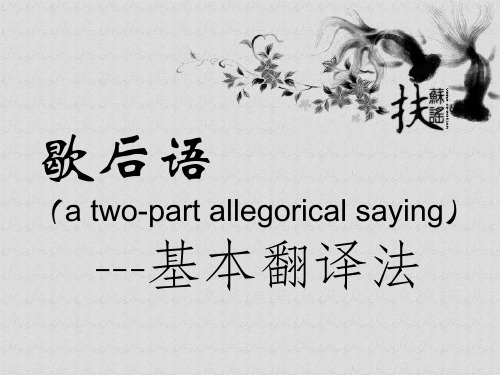
(a two-part allegorical saying)
---基本翻译法
汉语语言积淀的精华
(the accumulated essence of chinese language)
1.成语( idiom) 2.歇后语(a two-part allegorical saying)
3.谚语(proverbs)
4.直译加注法
•周瑜打黄盖---一个愿打,一个愿挨。 •Skillfully given by a Chou Yu and gladly taken by a Huang Gai (notes:a fourteen century novel based on events,which took place in the 3rd century AD。Chou Yu of the Kingdom of Wu had Huang Gai,another Wu general,cruelly beaten then sent him to the enemy camp in order to win battle by deceiving the enemy.)(有的时候这种翻译方法在一定的语境这不太可取。) •三个臭皮匠,合成一个诸葛亮。 •Three cobblers with their wits combined equal Chukeh Liang the master mind. •咸菜烧豆腐----有言在先(有盐在先) •Salted vegetable with bean cud–there is salt at the beginning, (pun)there are words beforehand。in this expression“言” (word)and“盐”(salt)are homophones。
歇后语大全趣味谚语的中英文两译参考等4篇汇总
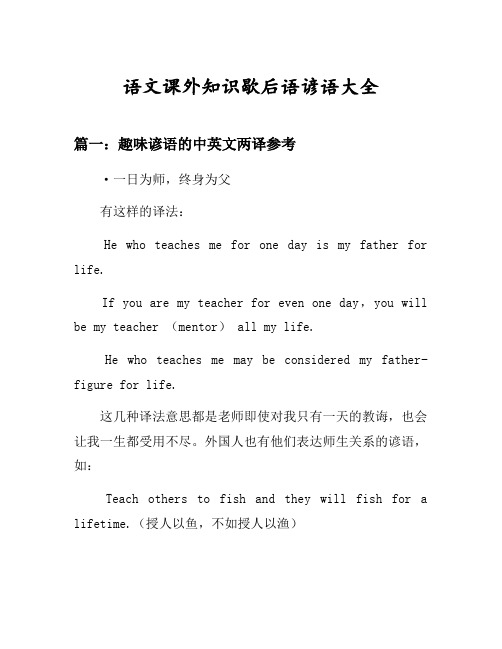
语文课外知识歇后语谚语大全篇一:趣味谚语的中英文两译参考·一日为师,终身为父有这样的译法:He who teaches me for one day is my father for life.If you are my teacher for even one day,you will be my teacher (mentor) all my life.He who teaches me may be considered my father-figure for life.这几种译法意思都是老师即使对我只有一天的教诲,也会让我一生都受用不尽。
外国人也有他们表达师生关系的谚语,如:Teach others to fish and they will fish for a lifetime.(授人以鱼,不如授人以渔)Give a man fish,he will have a meal; teach him to fish,he will have food all his life.·忠言逆耳,良药苦口有人译成:Faithful words are contrary to the ears;good medicine tastes bitter to the mouth.也有人反译为:Bitter words are medicine;sweet words bring illness.Good advice often jars on the ears; bitter pills have good effects.这些说法,老外也会一知半解,不如直接一点说成:我们猜您可能喜欢以下文章:雅思写作范文大全老外眼中的中国人(双语)2012雅思写作题目让你的文章成为焦点的窍门雅思写作技巧雅思大作文开头段经典套句老外:英国格拉斯哥租房,老外中介也靠谱日语常用口语学习:日常惯用语学习 (8)雅思写作机经常见中文俗语雅思口语站:宁波鸭思口语(推荐)老外一人饰12角搞笑视频走红被称为超牛老外2012雅思作文一位雅思G类考生的写作经验谈日语常用口语:日常惯用语学习 (7) 高考英语语法:高中英语语法-趣味谚语的中英文两译Honest advice may be distasteful to the recipient.Honest advice is hard to accept.Truth is a hard pill to swallow.更简单的说就是:Truth hurts.·近墨者黑,近朱者赤有人直译为:one who stays near vermilion gets stained red,and one who stays near ink gets stained black.(vermilion 是朱砂或鲜红色的意思)也有人译成:When you touch black,you become black;when you touch red,you become red.这种说法,恐怕老外一时无法理解真正含意。
典故与歇后语汉英翻译
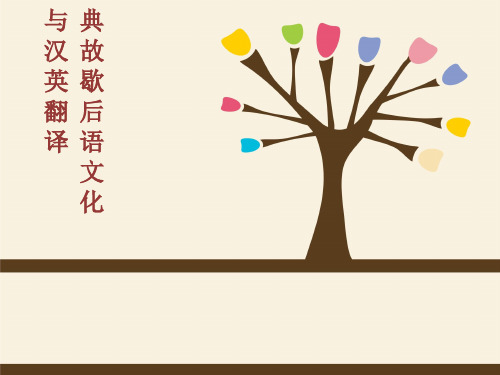
⒊保留形象加注
汉语:穷棒子闹翻身,是八仙过海,各显其 能··· ···(周立波《暴风骤雨》) 英语:The way we poor folks try to emancipate ourselves is just like way the Eight Faries crossed the sea each displaying his own talent··· ··· [注]把“八仙过海”直译成英语,再另外说明the eight immortales of Taoism in Chinese folklore,使读者 了解“八仙”是中国神话故事里的人物。
(二)神话传说 汉语: 点铁成金——《列仙传》 夸父追日、精卫填海——《山海经》 英语: the touch of Midas 源于希腊神话 (可以把任何东西都点成金子) (三)寓言故事 汉语:掩耳盗铃——《吕氏春秋》(自欺欺人) 英语:kill the goose that lays the golden eggs 源自《伊索寓言》 (sacrifice future gains to present needs)
汉语歇后语的汉英翻译方法
一、保留喻体形象,进行直译; 二、保留喻体形象,进行删译; 三、借用英语成语,改变喻体形象意译; 四、舍弃形象,进行意译; 五、照字面直译加解释。
一、保留喻体形象,进行直译
“朱斌这个人就是狗咬耗子,多管闲事!” "Chu Pin! He's like a dog worrying a mouse, can't mind his own business!" 去设埋伏我们都没有信心,想他一定在昨天晚上就早溜了,今天去也 是瞎子点灯白费蜡。 We had no confidence in today's ambush because we were sure he had escaped last night. It seemed as useless as a blind man lighting a candle. 后脑勺子长疮,自己看不见以为别人看丌见那才笑话咧。 If we have a boil on the back of our head we can't see it ourselves, but it's ridiculous to imagine other people can't see it.
歇后语英文翻译
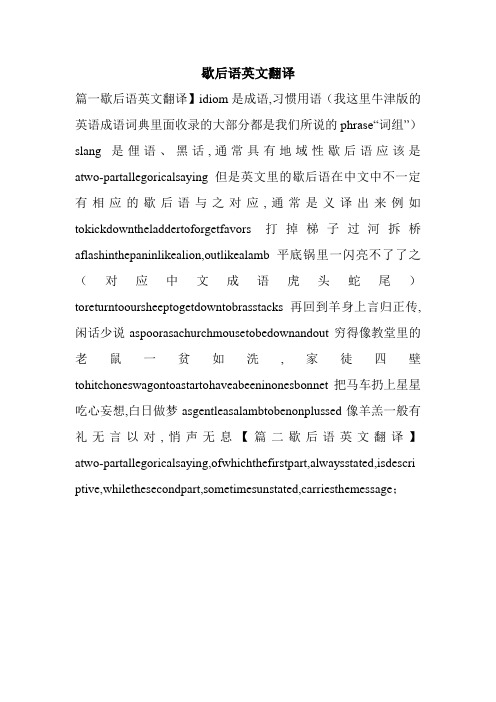
歇后语英文翻译
篇一歇后语英文翻译】idiom是成语,习惯用语(我这里牛津版的英语成语词典里面收录的大部分都是我们所说的phrase“词组”)slang是俚语、黑话,通常具有地域性歇后语应该是atwo-partallegoricalsaying但是英文里的歇后语在中文中不一定有相应的歇后语与之对应,通常是义译出来例如tokickdowntheladdertoforgetfavors打掉梯子过河拆桥aflashinthepaninlikealion,outlikealamb平底锅里一闪亮不了了之(对应中文成语虎头蛇尾)toreturntooursheeptogetdowntobrasstacks再回到羊身上言归正传,闲话少说aspoorasachurchmousetobedownandout穷得像教堂里的老鼠一贫如洗,家徒四壁tohitchoneswagontoastartohaveabeeninonesbonnet把马车扔上星星吃心妄想,白日做梦asgentleasalambtobenonplussed像羊羔一般有礼无言以对,悄声无息【篇二歇后语英文翻译】atwo-partallegoricalsaying,ofwhichthefirstpart,alwaysstated,isdescri ptive,whilethesecondpart,sometimesunstated,carriesthemessage;。
汉语歇后语常用译法
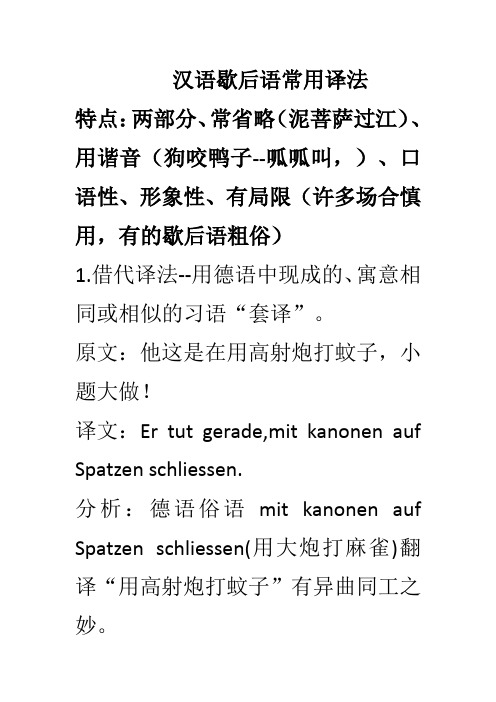
汉语歇后语常用译法特点:两部分、常省略(泥菩萨过江)、用谐音(狗咬鸭子--呱呱叫,)、口语性、形象性、有局限(许多场合慎用,有的歇后语粗俗)1.借代译法--用德语中现成的、寓意相同或相似的习语“套译”。
原文:他这是在用高射炮打蚊子,小题大做!译文:Er tut gerade,mit kanonen auf Spatzen schliessen.分析:德语俗语mit kanonen auf Spatzen schliessen(用大炮打麻雀)翻译“用高射炮打蚊子”有异曲同工之妙。
2.只译寓意--如德语中没有汉语歇后语前面部分形象生动的比喻,那就只译汉语歇后语的后半部分—寓意或说明部分。
原文:现在该是我们八仙过海、各显神通的时候了。
译文:Nun ist es die beste Zeit,dass wir alle unsere Faehigkeit zu voller Geltung bringen konnen.分析:德语中没有“八仙过海”的传说,所以就干脆不译了,只要把后面的寓意翻译得准确到位,也一样能达到表达目的。
当然,也可以采用“直译加注”的方法翻译:Nach einer chinisischen Volkssage zeigte jeder vonden acht Unterblicken fuer sich beim Uberqueren eines Meeres ihr besonderes Koennen.3.直译加注--有些汉语歇后语中的喻体是汉语中特有的人或事或物,所以一般在翻译成德语时将其“直译加注”,以收到生动形象的表达效果。
原文:这小子是哪吒下凡—一身火,免不了要烫着个人。
译文: Dieser Bursche benimmt sich wie ein heutiger Nezha und verletzt oft unwillentlich die anderen.(eine Figur in dem chinesischen klassischen Roman Reisebericht nach Westen ,die mit zwei Feurringen unter Fussenumherbewegen kann)分析:“哪吒”是何许人?中国人全都熟悉,但德国人不知道。
歇后语翻译
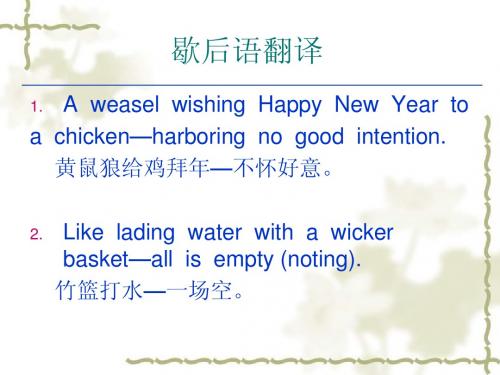
2.
3.
(Like) the Eight immortals crossing the sea—showing his or her special Prowess. 八仙过海---各显神通 If you peer at a person through a crach—he looks flat. 隔着门缝看人---把人看扁了
4.
5.
Chasing a dog by throwing meat dumplings at it—gone, never to return. 肉包子打狗----有去无回 Spreading oil on an ox horn—to make it sharper and more slippery or cunning and treacherous. 牛角抹油---又尖(奸)又滑(猾)
6.
7.
Like ants in a hot pot---they find nowhere to escape. 热锅上的蚂蚁---走投无路 A gathering of eight immortals— speaking and laughing. 八仙聚会---有说有笑
8.
9.
Wang Xiao er spending the New Year—one year is worse than another. 王小二过年---一年不如一年
Hale Waihona Puke 歇后语翻译1.A weasel wishing Happy New Year to a chicken—harboring no good intention. 黄鼠狼给鸡拜年—不怀好意。 Like lading water with a wicker basket—all is empty (noting). 竹篮打水—一场空。
从直译和意译角度看歇后语的汉译日
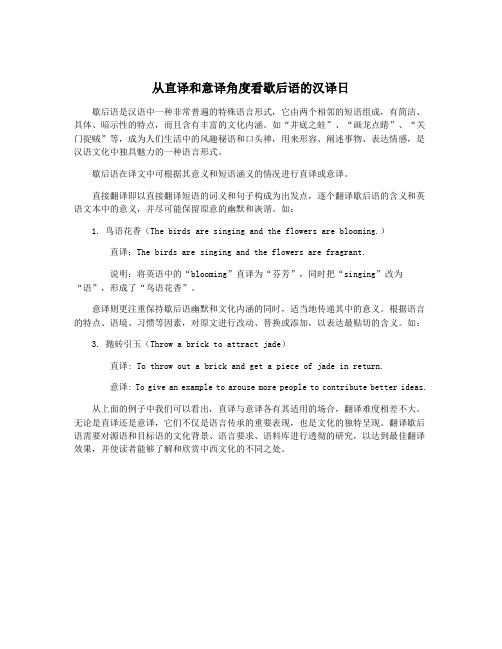
从直译和意译角度看歇后语的汉译日歇后语是汉语中一种非常普遍的特殊语言形式,它由两个相邻的短语组成,有简洁、具体、暗示性的特点,而且含有丰富的文化内涵。
如“井底之蛙”、“画龙点睛”、“关门捉贼”等,成为人们生活中的风趣秘语和口头禅,用来形容、阐述事物、表达情感,是汉语文化中独具魅力的一种语言形式。
歇后语在译文中可根据其意义和短语涵义的情况进行直译或意译。
直接翻译即以直接翻译短语的词义和句子构成为出发点,逐个翻译歇后语的含义和英语文本中的意义,并尽可能保留原意的幽默和诙谐。
如:1. 鸟语花香(The birds are singing and the flowers are blooming.)直译:The birds are singing and the flowers are fragrant.说明:将英语中的“blooming”直译为“芬芳”,同时把“singing”改为“语”,形成了“鸟语花香”。
意译则更注重保持歇后语幽默和文化内涵的同时,适当地传递其中的意义。
根据语言的特点、语境、习惯等因素,对原文进行改动、替换或添加,以表达最贴切的含义。
如:3. 抛砖引玉(Throw a brick to attract jade)直译: To throw out a brick and get a piece of jade in return.意译: To give an example to arouse more people to contribute better ideas.从上面的例子中我们可以看出,直译与意译各有其适用的场合,翻译难度相差不大。
无论是直译还是意译,它们不仅是语言传承的重要表现,也是文化的独特呈现。
翻译歇后语需要对源语和目标语的文化背景、语言要求、语料库进行透彻的研究,以达到最佳翻译效果,并使读者能够了解和欣赏中西文化的不同之处。
汉字歇后语谐音大全

汉字歇后语谐音大全英文回答:Chinese character puns, also known as "xiehouyu," are a type of traditional Chinese riddle or wordplay that involves using homophones or similar-sounding words to create humorous or clever phrases. These puns are widely used in Chinese culture and are often used in daily conversations, storytelling, and even in literature. They not only entertain people but also showcase the richness and creativity of the Chinese language.For example, one popular xiehouyu is "猪八戒照镜子" (zhū bā jiè zhào jìngzi), whic h literally translates to "Pigsy looking into a mirror." This phrase soundssimilar to "猪八戒照面子" (zhū bā jiè zhào miànzi), which means "Pigsy saving face." Pigsy is a character from the classic Chinese novel "Journey to the West," known for his vanity. This pun cleverly combines the character's name with the concept of saving face, creating a humorous andrelatable phrase.Another example is "一只蚂蚁搬家" (yī zhī mǎyǐ bān jiā), which means "An ant moving house." This phrasesounds similar to "一只蚂蚁办假" (yī zhīmǎyǐ bànjiǎ), which means "An ant making a fake." The pun plays on the similarity between the words "搬家" (bān jiā) and "办假" (bàn jiǎ), creating a playful and unexpected twist.中文回答:汉字歇后语是一种传统的中国谜语或文字游戏,通过使用同音或类似发音的词语来创造幽默或巧妙的短语。
基于关联翻译理论的汉语歇后语英译

基于关联翻译理论的汉语歇后语英译
本文旨在探讨基于关联翻译理论的汉语歇后语英译。
歇后语是汉语中一种独特的语言形式,具有浓厚的文化内涵和幽默感。
然而,其翻译却面临着很大的挑战。
因此,本文提出了基于关联翻译理论的翻译方法。
关联翻译理论认为,翻译不仅仅是对语言的转换,更是对文化的传递。
在翻译歇后语时,需要考虑其所蕴含的文化内涵和背景,以此来选择最恰当的翻译方式。
具体来说,可以采用以下几种方法:一是直译,即将歇后语的字面意思翻译成英文;二是意译,即根据歇后语的文化背景和内涵,选择最合适的英文表达方式;三是结合两种方法,既考虑字面意思,又兼顾文化内涵。
例如,汉语歇后语“井底之蛙”可以直译为“The frog at the bottom of the well”,意译为“A
frog in a well”,也可以结合两种方法,翻译为“A narrow-minded person”。
基于关联翻译理论的汉语歇后语英译需要兼顾文化和语言的传递,选择最合适的翻译方式。
论英汉翻译中的歇后语的翻译技巧与方法

狗撵 鸭子… … ~ 呱呱叫。( 按原意 , 简 直没法 泽成像 样
g u a g u a —
很 少 有 这 样 的形 式 , 具 有 明显 的特 点 , 是 汉 语 的 特 色 。在 英 汉 的 英 文 ) A d o g c h a s e s a l f o c k o f d u c k l i n g s 一 …
的翻译工作 中, 歇后语 的翻译是一项 难度很高 的工作 。但是 . j i a o ( c a u s i n g a n o i s e o f q u a c k / e x c e l l e n t ) ( a p u n : g u a g u a j i a o 歇后语又是汉族人 民 口头上经常用的一种语 言形式 .深 受人 a l s o me a n s e x c e l l e n t i n C h i n e s e ) 。
张 莉
( 江 苏徐州 幼儿 高等师范学校 江 苏・ 徐州 2 2 1 0 0 0 )
【 摘
要】 本文从歇后语的构成特 点 出 发, 从文化 差异 、 语 言特 色等方面探 讨歇后语的翻译技巧 . 以其对歇后语 的恰 当翻译 翻译技巧 构成 差异
提供指 导方法。
们喜爱 , 上 至领袖人 物 , 下至平 民百姓 , 也 时常用上 一两句来
上面 的两个例子 . 采用 了双关 的表 达方法 . 一个是谐 音 的
捅 科 打 浑 因而 对 它 的 研 究 翻译 也 是 必要 的 歇 后语 这一 名 称 方 法 , 另 一 个 是 谐 意 的方 法 。这 就 是 在 语 言 和 文 化 巾 . 特 殊 形
等的翻译都是有难度 的 , 而其中的歇后语也 是一个典型。歇后 C h i n e s e :s h u m e a n s ( 1 ) a l l b o o k s ;( 2 )t o l o s e a l l }
谚语,歇后语译英译

的规律生产生活经验的科学总结。国家人民 和中国人民之间存在相似的经验和阅历,对 世界的认识在不少方面也是相似的,这使两 个民族的谚语具有很大的相似性。有些汉语 谚语和英语谚语在意思上不谋而合,具有相 同的内涵,运用或大体相同的形象,或大体 相同的比喻和修辞来阐述相同的道理,在这 种情况下,运用同义的英语谚语来翻译汉语 谚语“一方面可使译文更加通顺,另一方面 更容易为译文读者理解和接受”。
丈二和尚摸不着头脑 What you said at the meeting made me completely at a loss. “摸不着头脑“其语义联想对汉民族而言是 不成问题的, 但对英语民族而言, 就不可能 产生同样的语义联想,因此采用意译法更 为合适。 骑驴看唱本——走着瞧 Let’s wait and see. 小胡同赶猪——直来直去 It’s better to be straightforward about thing.
谚语、歇后语的翻译
谚语的英译法
一、直译法
所谓直译法就是指在不违背译文语言规范以
及不引起错误联想的条件下,在译文中保留 中国谚语的比喻形象和民族、地方色彩的方 法。采用直译的谚语多半是英语和汉语在谚 语的比喻和形象方面基本相同的部分,或者 是直译后一目了然,不至于产生误解的。由 于大多数谚语采用生动形象的比喻,只要不 影响译文读者的理解,我们应尽可能地使用 直译方法
4、意译改造法
不同的语言有不同的艺术表现手段,
某一语 意、语言现象的积淀而形成的歇后语带有 深深的历史和文化烙印, 如何把歇后语中所 负载的文化价值移植到英语中去确实是件 很困难的事. 有些民族文化色彩浓的歇后语 在于形象和风格, 翻译时须以忠实于原文所 表达的意义为前提, 对语言形式适度地加以 改造, 同时又不悖于歇后语的习惯表达和结 构, 这时可采用意译改造法, 其目的就是让 译过来的东西使英语读者感到歇后语有味 道。
- 1、下载文档前请自行甄别文档内容的完整性,平台不提供额外的编辑、内容补充、找答案等附加服务。
- 2、"仅部分预览"的文档,不可在线预览部分如存在完整性等问题,可反馈申请退款(可完整预览的文档不适用该条件!)。
- 3、如文档侵犯您的权益,请联系客服反馈,我们会尽快为您处理(人工客服工作时间:9:00-18:30)。
汉语歇后语英语翻译方法
导言:目前,对“歇后语”一词的翻译难以统一。
有人翻译为Chinese enigmatic令人迷惑的folk similes直谕,明喻,这一译法的缺点是歇后语中不全是比喻,也有谐音或双关式歇后语。
有人翻译为quiz-cracks(隐语或谜语),同样也不全面。
于是有人提议直接翻译为xiehouyu in Chinese,这倒是有一定的可借鉴性。
因为歇后语是中华民族的独特文化,正如二胡(erhu)、中国功夫(Chinese gongfu)等。
但是,追根溯源,歇后语最早是文人之间的一种文字游戏,最早叫做“俏皮话”,因此,有人据此大胆翻译为Chinese folk wisecrack s。
比喻性歇后语的翻译方法
直译法:对大多数喻义歇后语,由于比喻部分生动形象,喻义部分逻辑推理合乎情理,不包含一词两义的双关或谐音,通常采用直译法,既传达源语的内容,又维持源语的形象,便于读者阅读和欣赏。
例如:
瞎子点灯--白费蜡。
It is as useless as a blind man lighting a candle.
黄鼠狼给鸡拜年--不怀好意。
A weasel wishing Happy New Year to a chicken- harbor ing 藏匿,心怀no good intention.
肉包子打狗--有去无回。
Chasing a dog by throwing meat dumplings at it-gone, never to return.
竹篮打水--一场空。
Like ladling舀或盛water with a wicker 枝条编的basket-all is empty (nothing).
八仙过海--各显其能。
(Like) the Eight Immortals crossing the sea-each showing his or her special prowess威力,本事. ( Each of them shows their true worth.)
隔着门缝看人--把人瞧扁了。
If you peer at a person through a crack-he looks flat.
兔子尾巴长不了。
The tail of a rabbit-cannot be long; won't last long.
谐音或双关式歇后语的翻译方法
解释法:解释法是一种行之有效的翻译方法,也是揭示源语文化内涵的重要途径,它是指在译文里保留原来的文化色彩,并加上简要的解释说明以突出其形象性。
解释法可以细分为解释性替代和解释性增补两种类型。
解释性替代
解释性替代是指当词语在源语和译语中的内涵意义相同,但联想意义不同时,不能按照字面翻译,而应该用解释性替代的方法翻译原文。
汉语中的成语即谚语翻译一般用解释性替代的方法来进行翻译,例如: 挥金如土spend money like water
解释性增补
解释性增补是指当源语中词语的内涵意义在译语中出现词汇空缺,其联想意义也出现空白时,译者必须保留源语的词语形象,而将其深层含义以解释的形式翻译出来,揭示出源语的文化特性或文化背景。
汉语中特有的歇后语在译成英语时,可以保留原语形象,再用解释性增补以表现其喻意。
利用汉语的谐音
牛角抹油——又尖(奸)又滑(猾)Spreading oil on an ox horn——to make it sharper and more slippery or cunning and treacherous.
李双双见到丈夫——有喜旺(希望)
Li Shuangshuang sees her husband——she has Xiwang now; like Li Shuangshuang meeting her husband Xiwang, a homophone for the Chinese word xiwang meaning hope, there is hope now.
利用双关语义
井底雕花——深刻Carving a flower design on the bottom of a well——carving deeply or get to the essence of something.
擀面杖吹火———一窍不通A rolling pin used as a bellows —no good at all.
王小二过年——一年不如一年
Wang Xiao'er spending the New Year——one year is worse than another; like Wang Xiao’er's life, one year is worse than another.
飞机上跳伞——一落千丈
Bale out跳伞from a flying plane——drop down a thousand zhang or suffer a drastic激烈的,猛烈的decline; like jumping from a flying plane, they decline drastically.
利用典故
英汉两种语言中存有大量由历史典故形成的习语,如,“东施效颦”、“名落孙山”、“叶公好龙”等等。
英语典故习语多来自《圣经》和希腊罗马神话,如Achilles’ heel(唯一致命弱点)、meet one's Waterloo(一败涂地)、Penelope's web(永远完不成的工作)、a Pandora's box(潘多拉之盒,代表灾难、麻烦、祸害的根源)等。
有关典故的这些习语结构简单,意义深远,往往是不能单从字面意义去理解和翻译的。
在翻
译利用典故的歇后语时,如果仅仅使用解释性增补方法是远远不够的,我们还应该对译文加以注释,从而从文化上和历史上更准确地传达汉语歇后语所包含的民族和文化特色。
八仙聚会——又说又笑
A gathering of Eight Immortals——speaking and laughing; like the Eight Immortals at a gathering, they are talking and laughing merrily.
Note: The Eight Immortals refer to the eight Taoists in a Chinese legend, namely, Han Zhongli, Zhang Guolao, Lü Dongbin, Tieguai Li, Han Xiangzi, Cao Guojiu, Lan Caihe and He Xiangu.
王羲之写字——横竖都好
A character out of Wang Xizhi’s hand——vertical strokes are as good as horizontal ones; like Wang Xizhi's calligraphy, it is good in every way.
Note: Wang Xizhi was a famous Chinese calligrapher and a Chinese character is usually composed of strokes, of which the vertical and horizontal ones are the most commonly used. Hengshu here has two interpretations: 1) the horizontal and vertical strokes; 2) horizontally or vertically, that is, in any way.
灶王爷扔石头——砸锅
The Kitchen God throwing stones——to break the pot or ruin the matter.
Note: The literal meaning of zaguo is to break a pot but it is usually used to mean ruining the matter.
秦叔宝卖马——穷途末路
Qin Shubao selling his horse——the last resort to overcome his difficulty; like Qin Shubao selling his horse, they are driven into a dead end
Note: Qin Qiong, styled Shubao, was a famous general in the Tang Dynasty. Before becoming a general, he was once penniless and had no way out but to sell his own horse。
